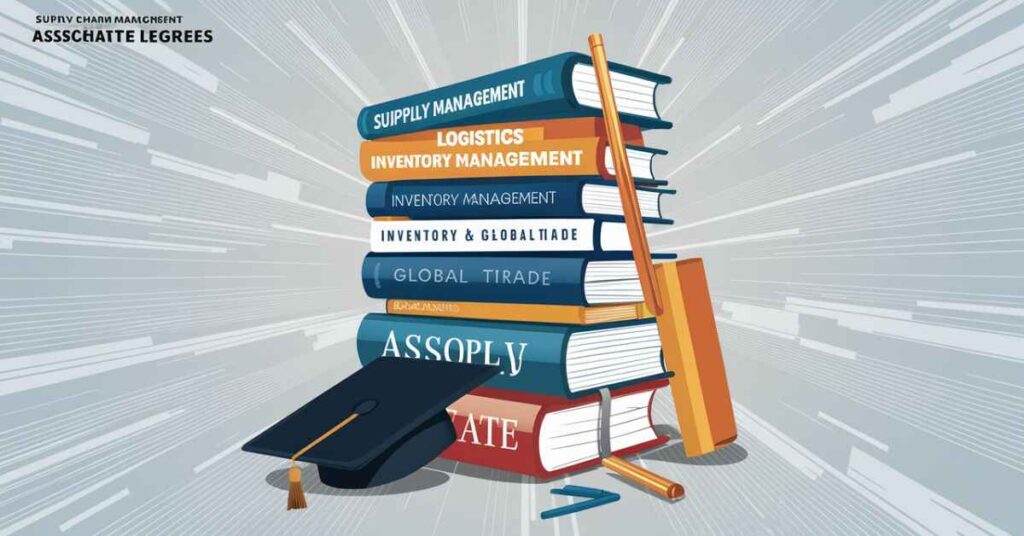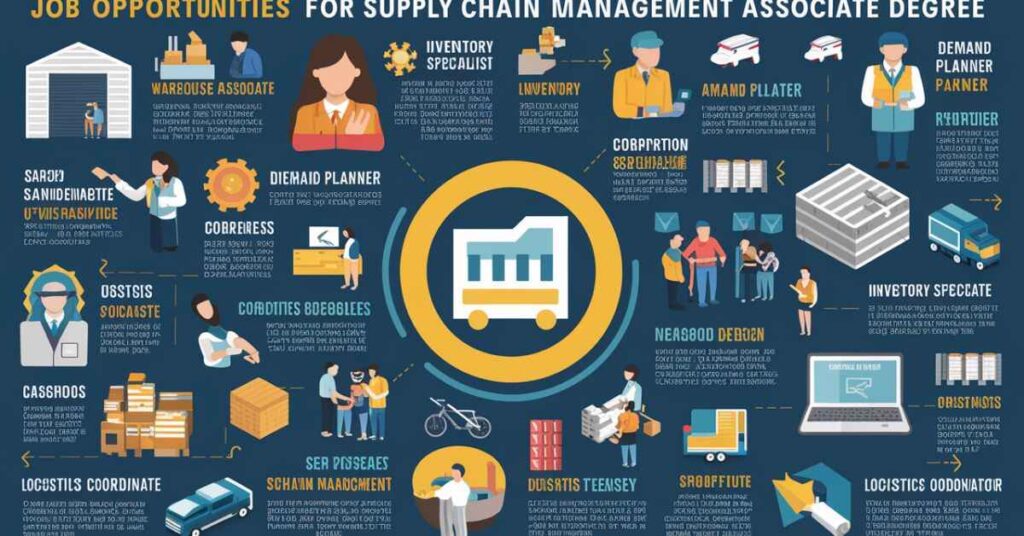In today’s fast-paced international economy, the challenging web of supply chain management has become the strength of successful companies. As companies attempt to optimize their processes, the demand for expert specialists in this arena continues to soar.
If you’re given a career that chains logistics, technology, and strategic thinking, a secondary degree in supply chain management might be your ticket to a world of moving opportunities. Let’s dive into the details of these plans and explore the gates they can open for you in the job marketplace.
What is Supply Chain Management?
Before we delve into the specifics of subordinate degrees, let’s break down what supply chain management involves. At its core, supply chain management is the instrumentation of a product’s journey from raw supplies to the end user. It’s a complex dance of gaining, production, carriage, and distribution, all aimed at get the best out of efficiency and reducing costs.
Key Components of Supply Chain Management:
- Sourcing and procurement
- Inventory management
- Warehousing
- Transportation and logistics
- Demand planning
- Customer service
In today’s digital age, supply chain management has evolved to incorporate advanced technologies like artificial intelligence, blockchain, and the Internet of Things (IoT). These innovations have transformed traditional supply chains into smart, data-driven networks that can adapt in real time to changes in demand or disruptions.
“The supply chain stuff is really tricky.” – Elon Musk
This quote from tech mogul Elon Musk underscores the complexity and importance of effective supply chain management in modern business.
Supply Chain Management Associate Degrees: An Overview

An associate degree in supply chain management usually takes two years to complete and make available a solid groundwork in the principles and practices of management global supply chains. These programs are designed to equip students with both academic knowledge and hands-on skills that are straightaway applicable in the workforce.
What You’ll Learn:
- Fundamentals of logistics and transportation
- Inventory control techniques
- Procurement strategies
- Supply chain technology and software
- Basic business principles and economics
- Project management
Types of Associate Degrees:
- Associate of Science (AS): More focused on transferable credits for those planning to pursue a bachelor’s degree later.
- Associate of Applied Science (AAS): Geared towards immediate entry into the workforce.
Many programs now suggest online options, allowing students to poise their education with work or family commitments. However, on-campus plans may provide more chances for hands-on learning and networking.
Read this Blog: High-Flying Careers: Exploring Jobs in Global Aerospace Logistics & Supply Chain Management
Curriculum Deep Dive
Let’s take a closer look at the courses you might encounter in a typical supply chain management associate degree program:
Core Courses:
- Introduction to Supply Chain Management
- Principles of Logistics
- Inventory Management and Control
- Transportation Systems
- Procurement and Sourcing
- Supply Chain Technology and Information Systems
- Business Communication
- Basic Accounting and Finance
Electives and Specializations:
- International Trade and Customs
- Sustainable Supply Chain Practices
- Lean Six Sigma for Supply Chains
- Supply Chain Risk Management
- E-commerce and Digital Supply Chains
Many programs also combine hands-on learning skills through internships, case studies, and virtual reality exercises. These practical components are crucial for increasing real-world skills and constructing a professional system.
Choosing the Right Program
When selecting a supply chain management associate degree program, consider the following factors:
- Accreditation: Ensure the program is accredited by a recognized body like ACBSP or AACSB.
- Curriculum: Look for a well-rounded program that covers all aspects of supply chain management.
- Faculty: Research the experience and qualifications of the teaching staff.
- Industry connections: Programs with strong ties to local businesses may offer better internship and job placement opportunities.
- Flexibility: Consider whether you need online or evening classes to accommodate your schedule.
- Cost: Compare tuition and fees, and explore financial aid options.
Top-Rated Programs in the USA:
| Institution | Location | Program Type | Notable Features |
| Columbus State Community College | Columbus, OH | AAS | Strong industry partnerships |
| Broward College | Fort Lauderdale, FL | AS | Online and on-campus options |
| Ivy Tech Community College | Indianapolis, IN | AAS | Extensive hands-on training |
| Fox Valley Technical College | Appleton, WI | AAS | Focus on technology integration |
Jobs You Can Qualify For with a Supply Chain Management Associate Degree
An associate degree in supply chain management can open doors to various entry-level and mid-level positions across multiple industries. Here’s a breakdown of potential career paths:

Entry-Level Positions:
- Logistics Coordinator: Oversee the movement of goods from suppliers to customers.
- Inventory Specialist: Manage stock levels and ensure efficient inventory control.
- Procurement Assistant: Support the purchasing process for materials and services.
- Supply Chain Analyst: Analyze data to improve supply chain efficiency.
- Distribution Center Supervisor: Manage operations in a warehouse or distribution facility.
Mid-Level Positions (with experience):
- Warehouse Manager: Oversee all aspects of warehouse operations.
- Transportation Planner: Optimize routes and modes of transportation for goods.
- Demand Planner: Forecast product demand and align supply chain accordingly.
- Sourcing Specialist: Identify and evaluate suppliers for goods and services.
Industry-Specific Opportunities:
- Retail: Merchandise planner, allocation analyst
- Manufacturing: Production scheduler, materials manager
- Healthcare: Medical supply coordinator, pharmaceutical logistics specialist
- Technology: Parts and components planner, reverse logistics coordinator
Career Outlook and Salary Expectations
The field of supply chain management is experiencing robust growth, driven by factors such as globalization, e-commerce, and the need for resilient supply chains in the face of disruptions.
- Employment of logisticians is projected to grow 30% from 2020 to 2030, much faster than the average for all occupations.
- The median annual wage for logisticians was $76,270 in May 2020.
Salary ranges can vary depending on factors such as location, industry, and experience. Here’s a general overview:
| Position | Entry-Level Salary Range | Mid-Career Salary Range |
| Logistics Coordinator | $40,000 – $55,000 | $55,000 – $75,000 |
| Inventory Specialist | $35,000 – $50,000 | $50,000 – $70,000 |
| Procurement Assistant | $38,000 – $52,000 | $52,000 – $72,000 |
| Supply Chain Analyst | $45,000 – $60,000 | $60,000 – $85,000 |
Advancing Your Career: Beyond the Associate Degree
While an associate degree can jumpstart your career in supply chain management, continuous learning, and professional development are key to long-term success in this dynamic field.

Certifications to Boost Your Credentials:
- Certified Supply Chain Professional (CSCP)
- Certified in Production and Inventory Management (CPIM)
- SCPro™ Certification
- Certified Supply Chain Analyst (CSCA)
Bachelor’s Degree Options:
Many experts choose to pursue a bachelor’s degree in supply chain management or a related field to progress their careers. Some universities offer 2+2 programs that allow you to allocate credits from your associate degree toward a bachelor’s.
Networking and Professional Organizations:
Joining professional organizations can provide valuable networking opportunities, access to industry events, and resources for continuing education. Some prominent organizations include:
- Council of Supply Chain Management Professionals (CSCMP)
- Association for Supply Chain Management (ASCM)
- Institute for Supply Management (ISM)
Real-World Success Stories
To illustrate the potential of starting with an associate degree in supply chain management, let’s look at two success stories:
Case Study 1: Sarah’s Journey from Warehouse to C-Suite
Sarah began her career with an associate degree in supply chain management from her local community college. She started as an inventory specialist at a small manufacturing company. Through hard work and continuous learning, she progressed to inventory manager within three years. Sarah then pursued her bachelor’s degree part-time while working, which opened doors to senior management positions. Today, she’s the Chief Supply Chain Officer at a mid-sized tech company, overseeing global operations.
Case Study 2: Mark’s Entrepreneurial Success
Mark leveraged his associate degree to secure a position as a logistics coordinator for an e-commerce startup. His understanding of supply chain principles proved invaluable as the company grew rapidly. Mark’s insights into efficient inventory management and distribution helped the startup scale successfully. Inspired by this experience, Mark later started his own third-party logistics company, which now serves numerous small to medium-sized online retailers.
Frequently Asked Questions
How long does it take to complete an associate degree in supply chain management?
Usually, it takes about two years of full-time study. Part-time options may be time-consuming but offer more rigidity.
Can I work while pursuing this degree?
Yes, many students work part-time or full-time while earning their degree, especially if they choose an online or evening program.
What’s the difference between logistics and supply chain management?
Logistics is a component of supply chain management, focusing specifically on the movement and storage of goods. Supply chain management encompasses a broader scope, including procurement, production planning, and customer service.
Are there scholarships available for supply chain management students?
Yes, many institutions and professional organizations offer scholarships for supply chain management students. Check with your school’s financial aid office and industry associations for opportunities.
How does an associate degree compare to a certificate program in supply chain management?
A subordinate degree provides a more wide-ranging education, together with general education courses, and normally takes longer to complete than a certificate program. Certificates are more dedicated to specific services but may not provide as broad a groundwork for career growth.
Conclusion
An associate degree in supply chain management can be an influential launchpad for a rewarding career in a field that’s indispensable to the global economy. From entry-level locations to prospective leadership parts, the chances are diverse and increasing. The key is to choose a program that brings into line with your goals, take advantage of hands-on learning practices, and commit to constant learning as the field evolves.
Whether you’re a recent high school graduate, a career changer, or someone looking to celebrate your experience with a degree, supply chain management offers a track to stability, development, and the fulfilment of solving complex logistical mysteries that keep our world moving.
Ready to take the next step? Research programs in your area, reach out to admissions offices and connect with professionals in the field. Your journey into the exciting world of supply chain management starts now!


![Find a Section 8 houses for rent with no deposit Revealed! [2024]](https://busslirra.com/wp-content/uploads/2024/08/Find-a-Section-8-houses-for-rent-with-no-deposit-Revealed-2024-300x157.jpg)







![Find a Section 8 houses for rent with no deposit Revealed! [2024]](https://busslirra.com/wp-content/uploads/2024/08/Find-a-Section-8-houses-for-rent-with-no-deposit-Revealed-2024-150x150.jpg)
